八年级英语上册Unit7Willpeoplehaverobots第1课时SectionA1a_2c同步测试新版人教新目标版
八年级英语上册Unit7Willpeoplehaverobots第1课时教案(新版)人教新目标版
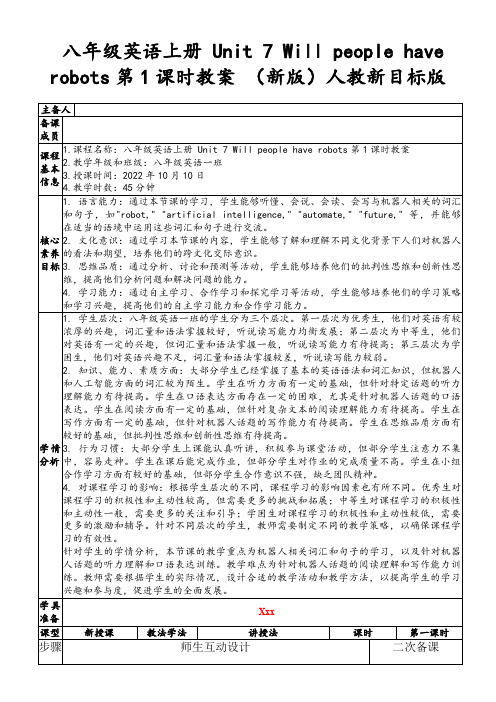
主备人
备课成员
课程基本信息
1.课程名称:八年级英语上册 Unit 7 Will people have robots第1课时教案
2.教学年级和班级:八年级英语一班
3.授课时间:2022年10月10日
例句:I believe that robot technology will bring many benefits to our lives, such as improving productivity and providing assistance in various tasks.
5. 选择一个机器人相关的伦理问题,如隐私保护、责任归属等,写一段话阐述你的观点。
5. 机器人在日常生活中的应用:举例说明机器人在家庭、医疗、教育等领域的应用实例。
6. 机器人伦理和社会影响:讨论机器人伦理问题,如隐私保护、责任归属等,以及机器人对就业、教育和社会生活的影响。
7. 动词一般将来时的用法:讲解动词一般将来时的构成、用法和例句。
8. 将来时态的句子结构:介绍将来时态的句子结构,如主语 + will + 动词原形等。
3. 思维品质:通过分析、讨论和预测等活动,学生能够培养他们的批判性思维和创新性思维,提高他们分析问题和解决问题的能力。
4. 学习能力:通过自主学习、合作学习和探究学习等活动,学生能够培养他们的学习策略和学习兴趣,提高他们的自主学习能力和合作学习能力。
学情分析
1. 学生层次:八年级英语一班的学生分为三个层次。第一层次为优秀生,他们对英语有较浓厚的兴趣,词汇量和语法掌握较好,听说读写能力均衡发展;第二层次为中等生,他们对英语有一定的兴趣,但词汇量和语法掌握一般,听说读写能力有待提高;第三层次为学困生,他们对英语兴趣不足,词汇量和语法掌握较差,听说读写能力较弱。
(人教版)八年级英语上册unit7_will_people_have_robots_第一课时至第五课时_全-2019精选
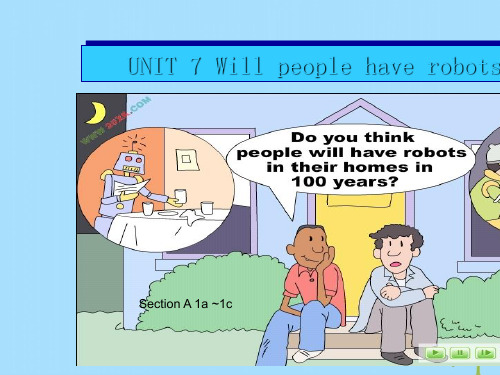
Please talk with your partner.
There will be… People will have…
1a How will the world be different in the future, 100 year these predictions. Check (√) A (for agree) or D (for disa
A: Where do you live ? B:I live in … . A: Where did you live ten years ago ? B:I lived in … A: What do you do ? / What’s your job ? B: I’m a/an … . A: What do you think you will be in ten years ? B:I think I will be … . A: Where will you live ? B:I will live in … .
evening. will help
• 4. They _____w_i_ll_p(lpalyay) soccer if it doesn
• 5. We _________ (have) a meeting tomor
will have
3a Some more predictions about things.
tenn. is a b.aby
一般将来时:动词在 原形。
3b PAIRWORK Look at activity 3a. Make predictions about Sally.
A: What do you think Sally will be in five years?
八年级英语上册Unit7Willpeoplehaverobots?(第1课时)课件(完整版)6

B.a few
C.little
D.few
7.It _B___,so don't need to take an umbrella.
A.will rain B.won't rain C.rains
D.rain
8.If there are _D___ people driving,there will be ________ air
Unit 7 Will people have robots? 第一课时 Section A(1a2c)
less
l
buy
to study
fewer is
二、用more,less,fewer填空。 6.We plant trees every year.There will be more trees in the
pollution.
A.less;less
B.less;fewer
C.fewer;fewer
D.fewer;less
9.Kate needs three _C___.
A.papers
B.pieces of papers
C.pieces of paper
D.piece of papers
10.—Will there be more robots in the future?
A:Hello,Sally! B:Hello,Tony! A:Do you think there will be robots in every home?
B:16.__B__
A:Do we have to go to school every day in the future?
B:No,we don't.17.__E__
八年级英语上册 Unit 7 Will people have robots(第1课时)教案

Unit 7 Will people have robots?Section A 1 (1a-2d)一、教学目标:1. 语言知识目标:1) 能掌握以下单词: pap er, pollution, prediction, future, pollute, environment, planet, earth, plant, part, play a part2) 能掌握以下句型:① What will the future be like?Cities will be more polluted. And there will be fewer trees.② Will people use money in 100 years?③ Will there be world peace?④ Kids will study at home on computers.⑤ They won’t go to school.2) 能了解以下语法:will + 动词原形来表达一般将来时态。
3)学会表达自己对未来的看法;学会谈论自己未来的打算。
二、教学重难点1. 教学重点:1) 学习掌握一般将来时态的意义和结构。
2) 掌握There be句型的一般将来时态的结构。
2. 教学难点:掌握more/fewer;more/less的用法。
情态动词will + 动词原形来表达一般将来时态。
三、教学过程Ⅰ. Lead-in1. 在大屏幕上向学生展示一些机器人的图片,让学生们说出谈论自己的未来的工作,对工作的打算等:What do you want to be when you grow up?Ss: I want to be a scientist.T: How are you going to do that?Ss: I’m going to study science hard.….2. 学生们根据图片来引导出机器人这一话题。
泗水县第一中学八年级英语上册Unit7WillpeoplehaverobotsSectionA第1课

第7单元 Will people have robots?Section A 单词paper n.纸;纸张 pollution n.污染;污染物 future n.将来;未来pollute v.污染 environment n.环境 planet n.行星earth n.地球;世界 plant v.种植 n.植物 part n.部分peace n.和平 sea n.海;海洋 build v.建筑;建造sky n.天空 prediction n.预言;预测短语play/take a part 参与;发挥作用 on computers 在电脑上 on paper 在纸上on the earth 在地球上 free time空闲时间 in danger处于危险之中live to be 200 years old活到200岁句型1. People will have robots in their homes.人们的家里会有机器人。
2. Everything will be free.一切东西都将是免费的。
3. Will people live to be 200 years old? 人们会活到200岁吗?Section B 单词apartment n.公寓套房 space n.太空;空间human adj.人的 n.人 dangerous adj.有危险的;不安全的already adv.已经;早已 factory n.工厂Japan 日本 believe v.相信;认为有可能disagree v.不同意;持不同意见;有分歧 even adv.甚至;连;愈加agree v.同意;赞成;应允 shape n.形状;外形fall v.& n.倒塌;跌倒;掉落 n.(美式)秋天 inside adv.& prep.在……里面possible adj.可能存在或发生的;可能的 word n.单词;词impossible adj.不可能存在或发生的;不可能的side n.一方(的意见、态度、立场) probably adv.很可能;大概during prep.在……期间 holiday n.假期;假日短语space station 太空站;宇宙空间站 in the future 在未来hundreds of许多;大量 over and over again 多次;反复地wake up 醒来 fall down突然倒下;跌倒;倒塌look for 寻找;寻求句型1. Today there are already robots working in factories. 现在已经有机器人在工厂里工作了。
八级英语上册Unit7WillpeoplehaverobotsSectionA(1A2d

Hale Waihona Puke A: Do you think there will be robots in people’s homes?
___A___D 1. People will have robots in their homes. ___A___D 2. People won’t use money. Everything will be free. ___A___D 3. Books will only be on computer, not on paper. ___A___D 4. Kids won’t go to school. They’ll study at home on
computers. ___A___D 5. There will only be one country. ___A___D 6. People will live to be 200 years old.
1b Listen and circle the predictions you hear in 1a.
B: Yes, there will. I think every home will have a robot.
A: Will kids go to school? B: No. Kids won’t go to school. They will
study at home on computers. …
2a Listen and circle the words you hear.
八年级英语上册 Unit 7 Will people have robots教案 (新版)人教新目标版
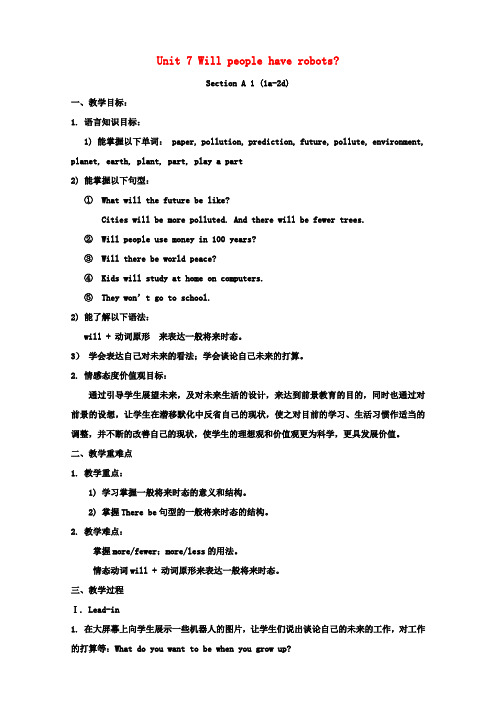
Unit 7 Will people have robots?Section A 1 (1a-2d)一、教学目标:1. 语言知识目标:1) 能掌握以下单词: paper, pollution, prediction, future, pollute, environment, planet, earth, plant, part, play a part2) 能掌握以下句型:① What will the future be like?Cities will be more polluted. And there will be fewer trees.② Will people use money in 100 years?③ Will there be world peace?④ Kids will study at home on computers.⑤ They won’t go to school.2) 能了解以下语法:will + 动词原形来表达一般将来时态。
3)学会表达自己对未来的看法;学会谈论自己未来的打算。
2. 情感态度价值观目标:通过引导学生展望未来,及对未来生活的设计,来达到前景教育的目的,同时也通过对前景的设想,让学生在潜移默化中反省自己的现状,使之对目前的学习、生活习惯作适当的调整,并不断的改善自己的现状,使学生的理想观和价值观更为科学,更具发展价值。
二、教学重难点1. 教学重点:1) 学习掌握一般将来时态的意义和结构。
2) 掌握There be句型的一般将来时态的结构。
2. 教学难点:掌握more/fewer;more/less的用法。
情态动词will + 动词原形来表达一般将来时态。
三、教学过程Ⅰ. Lead-in1. 在大屏幕上向学生展示一些机器人的图片,让学生们说出谈论自己的未来的工作,对工作的打算等:What do you want to be when you grow up?Ss: I want to be a scientist.T: How are you going to do that?Ss: I’m going to study science hard.….2. 学生们根据图片来引导出机器人这一话题。
八年级英语上册 Unit 7 Will people have robots?第一课时

Unit 7 Will people have robots学习目标:1.把握本课的重要辞汇短语及句子:将、会——机械人——树木——纸张——每件事物——较少的——污染——活到——免费——一百年后——更少的人——空闲时刻——更少污染—2.把握以下重要句型1.People will have robots in their homes.2. People won’t use money, everythi ng will be free.3. Books will only on computers not on paper.4. Kids won’t go to school.They’ll study at home on computers.5. There w ill only one country.6. People will live to be 200 years old.学习重难点:本课显现的生词及短语:2) 能正确运用“Will +动词原形”和There will be +名词表示以后。
能力目标:初步熟悉will表示一样以后时的用法和there be 句型表示一样以后时的用法。
温习可数名词和不可数名词并能正确利用more, fewer和less。
教学进程:S tep1 RevisionRevise the contents learnt last period and have a dictation.Step2 展现交流教师在黑板上画一个时刻轴,标记出three years ago、now、in 100 years,让学生先看前两个时刻点,描述出自己的情形。
讨论:预言一百年后的世界将是什么样子??然后听录音,选出你所听到的单词,并把下面的句子读熟。
1.People will have ro bots in their homes.2. People won’t use money, everything will be free.3. Books will only on comp uters not on paper.4. Kids won’t go to school.They’ll study at home on computers.5. There will only one country.6. People will live to be 200 years old.Step3 对话练习。
八年级英语上册 Unit 7 Will people have robots?(第1课时)教案 (新版)人教新目标版

Unit 7 Will people have robots?Section A 1 (1a-2d)一、教学目标:1) 能掌握以下单词:paper, pollution, prediction, future, pollute, environment, planet, earth, plant, part, play a part2) 能掌握以下句型:①What will the future be like?Cities will be more polluted. And there will be fewer trees.②Will people use money in 100 years?③Will there be world peace?④Kids will study at home on computers.⑤They won’t go to school.2) 能了解以下语法:will + 动词原形来表达一般将来时态。
3)学会表达自己对未来的看法;学会谈论自己未来的打算。
二、教学重难点1. 教学重点:1) 学习掌握一般将来时态的意义和结构。
2) 掌握There be句型的一般将来时态的结构。
2. 教学难点:掌握more/fewer;more/less的用法。
情态动词will + 动词原形来表达一般将来时态。
三、教学过程Ⅰ. Lead-in1. 在大屏幕上向学生展示一些机器人的图片,让学生们说出谈论自己的未来的工作,对工作的打算等:What do you want to be when you grow up?Ss: I want to be a scientist.T: How are you going to do that?Ss: I’m going to study science hard.….2. 学生们根据图片来引导出机器人这一话题。
Ⅱ. Presentation1. 引导学生们看大屏幕上的图片,根据图示来理解will来表达一般将来时态。
英语人教版八年级上册Unit-7Will-people-have-robots
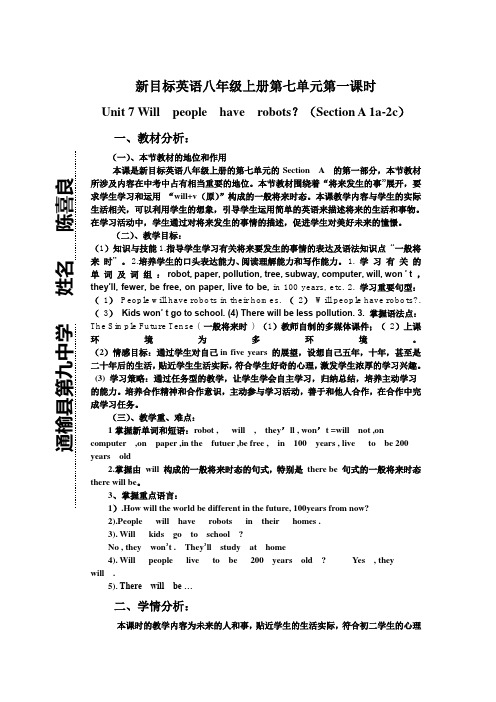
Unit 7 Will people have robots?(Section A 1a-2c)一、教材分析:(一)、本节教材的地位和作用本课是新目标英语八年级上册的第七单元的Section A 的第一部分,本节教材所涉及内容在中考中占有相当重要的地位。
本节教材围绕着“将来发生的事”展开,要求学生学习和运用“will+v(原)”构成的一般将来时态。
本课教学内容与学生的实际生活相关,可以利用学生的想象,引导学生运用简单的英语来描述将来的生活和事物。
在学习活动中,学生通过对将来发生的事情的描述,促进学生对美好未来的憧憬。
(二)、教学目标:(1)知识与技能1.指导学生学习有关将来要发生的事情的表达及语法知识点“一般将来时” 。
2.培养学生的口头表达能力、阅读理解能力和写作能力。
1. 学习有关的单词及词组:robot, paper, pollution, tree, subway, computer, will, won ’ t ,they’ll, fewer, be free, on paper, live to be, in 100 years, etc. 2. 学习重要句型:(1)People will have robots in their homes. (2)Will people have robots?. (3)Kids won’ t go to school. (4) There will be less pollution. 3. 掌握语法点:The Simple Future Tense ( 一般将来时) (1)教师自制的多媒体课件;(2)上课环境为多环境。
(2)情感目标:通过学生对自己in five years 的展望,设想自己五年,十年,甚至是二十年后的生活,贴近学生生活实际,符合学生好奇的心理,激发学生浓厚的学习兴趣。
(3) 学习策略:通过任务型的教学,让学生学会自主学习,归纳总结,培养主动学习的能力。
英语人教版八年级上册Unit-7-Will-people-have-robots
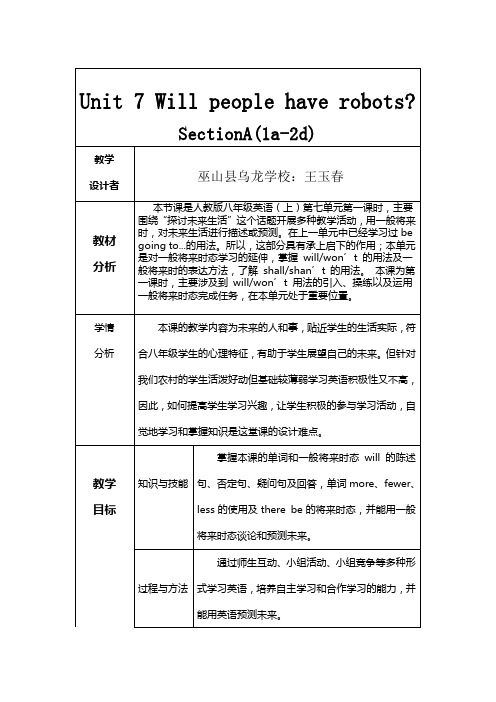
Yes,…will./No,…won’t.
There will/won’t be( more/fewer/less)…
小组评价
教
学
后
记
该教学设计非常贴近学生的生活实际,条理清晰。在引入和课程进行中充分考虑到学生对英语学习感兴趣不浓,运用了许多更直观,更引人入胜的设计,让学生在游戏中巩固新知识,激发学生的学习兴趣使学生乐于学习、乐于探究。在教学过程的设计中充分体现了老师引导,学生自主学习和合作探究学习的观点。设计过程详细但又不受书本内容的局限,把听力归纳在一起来,让学生集中练习。在教学活动中通过预测地球进行德育教育的渗透,增强环保意识。在重点语法教学方面,采用给出实例,让学生归纳总结的方法,不仅教给学生本课的重要语法,同样也交给学生自学的有效方法。
过程与方法
通过师生互动、小组活动、小组竞争等多种形式学习英语,培养自主学习和合作学习的能力,并
能用英语预测未来。
情感态度与价值观
培养合作意识和集体荣誉感,增强环保意识。
教学重点
学习will一般将来时态的构成方式。
单词more、fewer、less的用法,能熟练运用一般将来时态
预测未来。
教学难点
用will一般将来时态表达未来。
Step7.Exercise and homework.
设计理念:复习巩固本堂课所学的知识。
板
书
设
计
Unit 7 Will people have robots? --- Section A
一般将来时:will
1.肯定句:主+will +V(原形)+其他.
2.否定句:主+won’t +V(原形)+其他.
八年级英语上册 Unit 7 Will people have robots(1a-2c)教材分析
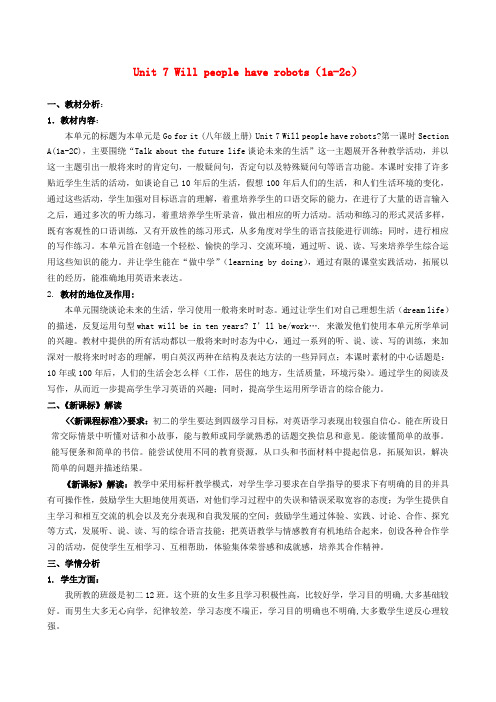
Unit 7 Will people have robots(1a-2c)一、教材分析:1.教材内容:本单元的标题为本单元是Go for it (八年级上册) Unit 7 Will people have robots?第一课时Section A(1a-2C),主要围绕“Talk about the future life谈论未来的生活”这一主题展开各种教学活动,并以这一主题引出一般将来时的肯定句,一般疑问句,否定句以及特殊疑问句等语言功能。
本课时安排了许多贴近学生生活的活动,如谈论自己10年后的生活,假想100年后人们的生活,和人们生活环境的变化,通过这些活动,学生加强对目标语言的理解,着重培养学生的口语交际的能力,在进行了大量的语言输入之后,通过多次的听力练习,着重培养学生听录音,做出相应的听力活动。
活动和练习的形式灵活多样,既有客观性的口语训练,又有开放性的练习形式,从多角度对学生的语言技能进行训练;同时,进行相应的写作练习。
本单元旨在创造一个轻松、愉快的学习、交流环境,通过听、说、读、写来培养学生综合运用这些知识的能力。
并让学生能在“做中学”(learning by doing),通过有限的课堂实践活动,拓展以往的经历,能准确地用英语来表达。
2. 教材的地位及作用:本单元围绕谈论未来的生活,学习使用一般将来时时态。
通过让学生们对自己理想生活(dream life)的描述,反复运用句型what will be in ten years? I’ll be/work…. 来激发他们使用本单元所学单词的兴趣。
教材中提供的所有活动都以一般将来时时态为中心,通过一系列的听、说、读、写的训练,来加深对一般将来时时态的理解,明白英汉两种在结构及表达方法的一些异同点;本课时素材的中心话题是:10年或100年后,人们的生活会怎么样(工作,居住的地方,生活质量,环境污染)。
通过学生的阅读及写作,从而近一步提高学生学习英语的兴趣;同时,提高学生运用所学语言的综合能力。
八年级英语上册Unit7Willpeoplehaverobots(第1课时)单词课教案人教新目标版
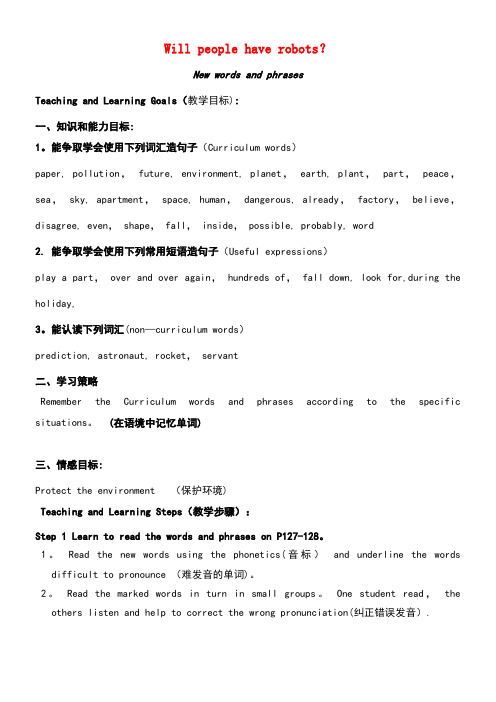
Will people have robots?New words and phrasesTeaching and Learning Goals(教学目标):一、知识和能力目标:1。
能争取学会使用下列词汇造句子(Curriculum words)paper, pollution, future, environment, planet, earth, plant, part, peace,sea, sky, apartment, space, human, dangerous, already, factory, believe,disagree, even, shape, fall, inside, possible, probably, word2. 能争取学会使用下列常用短语造句子(Useful expressions)play a part, over and over again, hundreds of, fall down, look for,during the holiday,3。
能认读下列词汇(non—curriculum words)prediction, astronaut, rocket, servant二、学习策略Remember the Curriculum words and phrases according to the specific situations。
(在语境中记忆单词)三、情感目标:Protect the environment (保护环境)Teaching and Learning Steps(教学步骤):Step 1 Learn to read the words and phrases on P127-128。
1。
Read the new words using the phonetics(音标)and underline the words difficult to pronounce (难发音的单词)。
Unit7WillpeoplehaverobotssectionB教案人教版英语八年级上册
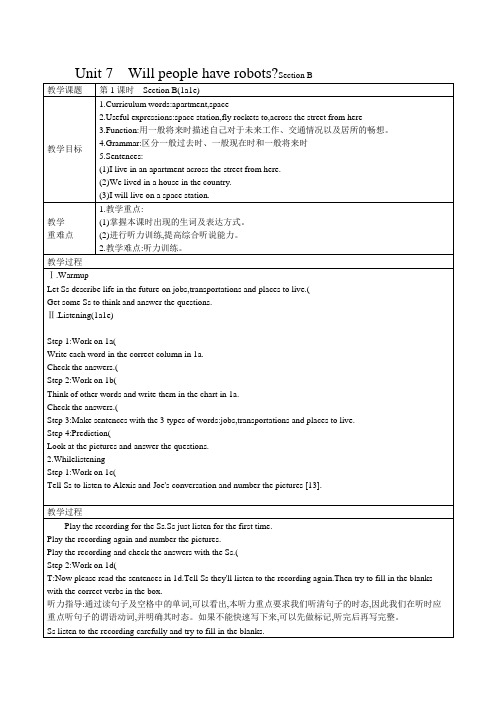
Step 2:Read paragraphs [12] and answer the questions.(
Check the answers.(
Step 3:Read paragraphs [34] and mark T(true) or F(false).(
教学过程
Play the recording for the Ss.Ss just listen for the first time.
Play the recording again and number the pictures.
Play the recording and check the answers with the Ss.(
Keys:in;crowded;people's;machines;pollution;eating;their;doing;anything/something;to travel
Ⅳ.Homework(
1.Write a short paragraph about your life in the past,present and the future.
(3)I will live on a space station.
教学
重难点
1.教学重点:
(1)掌握本课时出现的生词及表达方式。
(2)进行听力训练,提高综合听说能力。
2.教学难点:听力训练。
教学过程
Ⅰ.Warmup
Let Ss describe life in the future on jobs,transportations and places to live.(
Get some Ss to think and answer the questions.
八年级英语上册《Unit7Willpeoplehaverobots》的知识点归纳
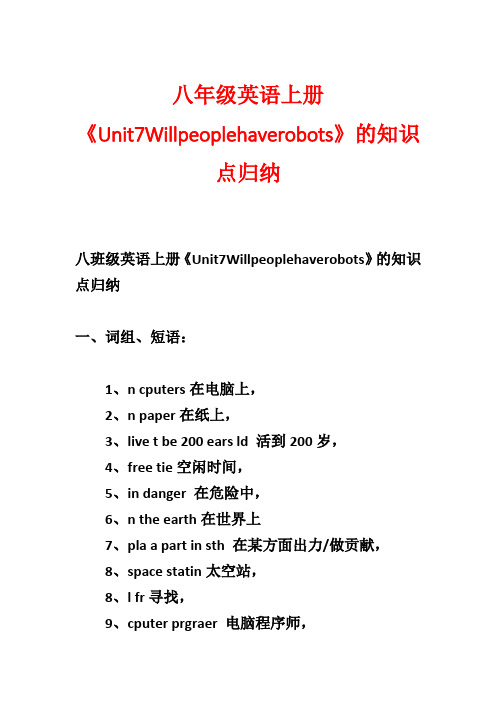
八年级英语上册《Unit7Willpeoplehaverobots》的知识点归纳八班级英语上册《Unit7Willpeoplehaverobots》的知识点归纳一、词组、短语:1、n cputers在电脑上,2、n paper在纸上,3、live t be 200 ears ld 活到200岁,4、free tie空闲时间,5、in danger 在危险中,6、n the earth在世界上7、pla a part in sth 在某方面出力/做贡献,8、space statin太空站,8、l fr寻找,9、cputer prgraer 电脑程序师,10、in the future 在将来,11、hundreds f成百上千的.,12、the sae…as与…一样,13、ver and ver again 反复,14、get bred 无聊,abe/perhaps 用于句首。
Mabe/Perhaps u are right.1. during / fr / in 介词,在……期间。
说到某事是在某一段时间之间发生的用during; 说到某事持续多久则用fr; 说到某事具体发生的时间用in.We visited an places f interest during the suer hlida.I’ve been here fr tw we es.The usuall leave schl in ul.一般将来时结构:肯定式:主语+ will/shall + 动词原形+ 其他will 用于各种人称,shall 用于第一人称。
主语+ be ging t + 动词原形+ 其他be 随人称、数和时间的变化而变换。
否定式:在will/shall/be 后面加nt. will nt = wn’t .一般疑问句:将will/shall/be 提到主语前面。
There be 句型的一般将来时:There will be + 主语+ 其他,意为:将会有。
人教八上Unit7Willpeoplehaverobots(SectionB1a1e)教学设计

(一)教学重难点
1.重点:学生能够熟练运用一般将来时(will)来预测和表达未来;掌握与机器人相关的词汇和表达;能通过阅读短文获取、整理和归纳信息。
2.难点:学生在实际语境中灵活运用一般将来时(will);阅读理解能力的提升,尤其在信息提取和归纳方面。
(二)教学设想
1.情境创设:结合学生的生活经验和兴趣,创设与机器人相关的真实语境,让学生在情境中感知、体验和运用目标语言。
人教八上Unit7Willpeoplehaverobots(SectionB1a1e)教学设计
一、教学目标
(一)知识与技能
1.学生能够掌握与机器人相关的词汇,如robot, appearance, ability, intelligence, perform, invent, predict等,并能熟练运用这些词汇描述机器人的外貌、能力和智能。
2.阅读理解:完成一篇关于未来机器人发展的短文阅读,并回答相关问题。要求学生通过阅读,提高信息提取和归纳能力。
3.课后调查:分组进行课后调查,了解家人、朋友对未来机器人的看法和期待。每组整理调查结果,形成一份简要的调查报告,并在下节课上进行分享。
4.角色扮演:设计一个关于未来机器人的对话场景,与同学进行角色扮演。要求使用一般将来时(will)进行表达,锻炼学生的口语交流能力。
3.教师强调科技进步对社会生活的影响,引导学生关注科技发展,培养他们的责任感和社会责任感。
4.最后,教师布置课后作业,要求学生结合本节课所学,预测未来生活中的机器人,并用自己的语言进行描述。
五、作业布置
为了巩固本节课所学知识,提高学生的英语综合运用能力,特布置以下作业:
1.写作任务:结合本节课学习的主题“Will people have robots?”,让学生运用一般将来时(will)描述自己设想的未来机器人。要求至少包含机器人的外貌、能力和智能三个方面,字数不少于80词。
- 1、下载文档前请自行甄别文档内容的完整性,平台不提供额外的编辑、内容补充、找答案等附加服务。
- 2、"仅部分预览"的文档,不可在线预览部分如存在完整性等问题,可反馈申请退款(可完整预览的文档不适用该条件!)。
- 3、如文档侵犯您的权益,请联系客服反馈,我们会尽快为您处理(人工客服工作时间:9:00-18:30)。
Unit 7 Will people have robots?第一课时Section A (1a-2c)A 基础起航Ⅰ.翻译下列词组。
1.在纸上__on_paper__2.活到 __live_to_be__3.100年之后 __in_100_years__4.更少的污染 __less_pollution__5.更少用地铁 __use_the_subways_less__6.免费 __be_free__Ⅱ. 根据句意及首字母提示完成句中单词。
1.Her teacher marked the exam papers and wrote the students' grades on a piece of paper__.2.Everything__will be free in 100 years, I predict.3.They are thinking about the life in the future__.4.There will b e more cars in the city. I think there will be more pollution__.5.What's your __prediction__(预言) about the robot?Ⅲ. 用适当的介词填空。
1.What do you think he will be __in__ 10 years?2.Books will only be __on__computers, not __on__ paper.3.What's your prediction __about__ technology?4.Less pollution will be good __for__ the earth.5.I saw a robot __on__TV — it was cleaning the kitchen.6.The second resolution is __about__ improving my English.7.I am going to learn to sing because my family love to listen __to__ music.8.These are good reasons __for__ this.Ⅳ. 根据汉语意思完成下列句子,每空一词。
1. 200年后将会有更少的污染,更多的树。
There __will__ __be__ __less__ __pollu tion__a nd __mor e__ __trees__ in 200 years.2.人们将不再使用钱。
People __will__ __not__ __use__ money anymore.3.我认为人类不会活到150岁。
I don't think people __can/will__ __live__ __t o__ __be__ 150 years old.4.未来,城市的人口会更多。
There __will__ __be__ more people in the city in the future.B 语法扬帆Ⅴ. 用more,fewer或less填空。
1.She has to eat __less__ meat becaus e she wants to be thinner.2.Be friendly and kind to your friends. Or you will have __fewer__ friends.3.Don't worry. We'll give you __more__ information.4.I'm healthier now, because I eat __more__ vegetables thes e days.5.The cities will be more crowded because there will be __more__ people.Ⅵ. 按要求完成下列各题,每空一词。
1.Kids will come back to school tomorrow.Kids __won't__come back to school tomorrow.(改为否定句)__Will__ __kids__ come back to school tomorrow?(改为一般疑问句)No,__they__ __won't__.(作否定回答)2.There will be a heavy rain tomorrow.__There__ __won't__ be a heavy rain tomorrow. (改为否定句)__Will__ __there__ __be__ a heavy rain tomorrow? (改为一般疑问句)Yes,__there__ __will__.(作肯定回答)C 提升冲浪Ⅶ.完形填空。
There are many kinds of pollution around us, __1__ air pollution, soil(土壤) pollution, noise pollution and light pol lution. They are bad __2__ our health in many ways.Burning gas, oil and coal creates air pollution. It can cause sore eyes and breathing __3__.In our life, litter is everywhere. It __4__ our environment dirty. People put lots of rubbish on the land. Farmers use too __5__ chemicals(化学物质) in the fields. They are __6__ for the soil. So soil pollution is becoming more and more __7__.Noise pollution can make people deaf. __8__, people may lose their hearing if they work in a __9__ place for a long time. Too __10__ noise can __11__ cause high_blood_pressure.Working for a long time in strong light __12__ cause some other problems. It makes people feel __13__ and the eyes can be very __14__.With __15__ pollution, our planet will become greener and our health will be better. Let's be greener people.( A )1.A.such as B.for exampleC.as well as D.because of( C )2.A.to B.inC.for D.of( C )3.A.questions B.predictionsC.problems D.environment( A )4.A.makes B.helpsC.gives D.lets( B )5.A.much B.manyC.little D.few( C )eful B.importantC.bad D.talented( A )7.A.serious B.importantC.clear D.dangerous( C )8.A.In fact B.M ake sureC.For example D.Such as( B )9.A.busy B.noisyC.quiet D.full( B )10.A.many B.muchC.heavy D.high( C )11.A.as well B.tooC.also D.either( D )12.A.must B.needC.should D.may( C )fortable B.simpleC.terrible D.wonderful( D )14.A.meaningless B.unhappyC.unable D.uncomfortable( B )15.A.little B.le ssC.few D.fewerⅧ.阅读理解。
What will our homes be like in the future? Here are some predictions:◆Want to take a shower when you get home? You'll be able to let your smart water heater (热水器) to start heating up when you're on your way home.◆Did I turn off the oven? Did I close the window? Everyone may have a moment like that. But in the future, your home will check these for you.◆In your home of the future, all of your devices can work together to make your life more comfortable. When you turn on the lights in the morning, your windows will open at the same time. The lights will slowly turn off by themselves after the sun appears.◆Your home may have dangers. The hackers (黑客) could open your door and make your room messy through your phone or other devices. Your home will tell you about it but you can't arrive in time. So people will have to be careful of their personal information.( B )1.In the future, what can we do on our way home?A.Take a shower.B.Let the water heater work.C.Keep working.D.Have a look at our smart home devices.( A )2.What will our life be like in the future in smart homes?A.More comfortable. B.Much busier.C.A little safer. D.More boring.( B )3.Who will let you know if someone breaks into your home in the future?A.Your friend. B.Your home.C.The police. D.Your neighbor.( B )4.What can we NOT learn from the passage?A.There might be dangers about smart homes in the future.B.The hackers might only come into your home through the phone.C.The lights will turn off by themselves when the sun comes out.D.You don't need to worry if you forget to close windows in the future.( D )5.What's the best title of the passage?A.Some Beautiful HousesB.Some Famous PredictionsC.A Better WorldD.Homes of the Future读后词汇拓展猜出画线单词的词性和中文意思以及词组的中文意思,并收入自己的小词典。
